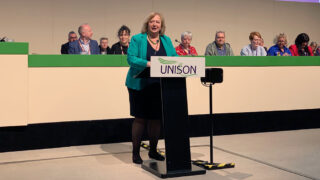Elizabeth Bayliss and Kareema McCarthy. Pictures: Marcus Rose
ALTHOUGH Elizabeth Bayliss and Kareema McCarthy work at the same hospital, Kettering General in the East Midlands, they have only recently become friends – not on the wards, but at university.
That’s because the pair, who a few months ago were both healthcare assistants in different parts of the hospital, are now part of the pilot scheme to create a new breed of healthcare professional – the nursing associate.
Posited as a role that sits between the healthcare assistant and the registered nurse, with its own level of knowledge and skills, it involves two years training, both on the job and at university. For 2,000 healthcare assistants, that means the immediate chance to develop their NHS careers. And for some, like Elizabeth and Kareema, it means their desire to become nurses could now become a reality.
I just thought ‘Wow, I have to go for it.’ I wanted to get on that track
Elizabeth, 37, had been a healthcare assistant with the NHS for 10 years, working on the surgical wards at Kettering. She had always sought training, improving her skills, and was on the verge of becoming a grade 3, which is as far as she could have progressed as a healthcare assistant. A year ago, it seemed that the mother of five’s ambition to be a nurse might never be fulfilled.
“My education didn’t allow for nurse training, and neither did my finances,” she says. “If I wanted to go on and do nursing, I would have had to leave employment and become a full-time student, which at my age, with a mortgage and children was just not a viable option.
“My idea was that when my youngest finished high school I would have a go, in my Fifties. But I did wonder if it would ever happen.
“Then, last December, my matron came to me for a word. She told me there was going to be an opportunity and she wanted to put me forward for it, because she thought I had the abilities, the skill and the experience to get on this course. It was like a dream.”
Kareema, 33, came to the NHS later than Elizabeth, having had a range of other jobs, including running her own photography studio. But like Elizabeth she had always harboured the desire to be a nurse. After working as a carer for a private company, she joined Kettering in July 2016 as a healthcare assistant in A&E. When she heard of the trainee nursing associate (TNA) pilot, she jumped at it.
“I knew I wouldn’t be able to go to university straight away to do nurse training,” she says. “There was no chance. I’ve got two kids. We need income. It would have been impossible. So, I was going to work as a healthcare assistant and see what happened. Then this came along. I just thought ‘Wow, I have to go for it.’ I wanted to get on that track.”
The pilot scheme
The nursing associate is a new support role introduced by Health Education England. Two thousand people are currently engaged in the pilot scheme, across 11 test sites in England, which represent partnerships between universities, NHS trusts, GP practices and other health employers. Kettering Hospital and Northampton University – where Elizabeth and Kareema are studying – fall into the Midlands & East pilot site.
Their programmes provide trainees with a combination of taught education and on-the-job learning, leading to a foundation degree. In the hospital, each TNA will perform his or her old tasks as healthcares, but is assigned a nurse mentor on their ward, and other mentors as they learn about the work of other wards and outside the hospital, such as in GP surgeries and nursing homes.
From the outset, UNISON stated its concern that the introduction of the role might distract attention from the severe nursing crisis affecting the NHS – and that employers could treat nursing associates as merely a cheap alternative to registered nurses.
At the same time, the union saw that the new training could provide welcome career development for existing healthcare assistants and a stepping stone, for those who wished it, towards becoming a qualified nurse. To that end it played an active role in discussions about the pilot schemes and secured agreement on a nationally consistent pay rate for the TNAs.
And judging by the experiences of UNISON members Elizabeth and Kareema, the union’s work has been justified.

“I look at it as a puzzle,” says Elizabeth. “As a healthcare assistant you’re aware of your little piece, and you do it, but you don’t really see the rest of the puzzle and you don’t really see where you fit in. But as a nursing associate I have to know what the whole puzzle looks like, in the same way as a nurse or a doctor.
“As a healthcare assistant I get told to take someone’s blood pressure, to take their vital signs, I write it all down, I tell the nurse and my job’s done. As a nursing associate I will know what operations the patient has had, I’ll know the risks that were involved in that operation, I’ll know his medical history, I will know how his medications will affect him.
“So when I look at the vital signs I will understand that if the temperature is quite high, but the blood pressure’s fine, it could be this, it could be that. And I’m going to make decisions about what to do – I might decide to take his bloods, I might get a urine sample.
“But it’s not up to me as a nursing associate to change his care pathway. That’s still down to the nurse.”
Adds Kareema: “Nursing associates are going to be accountable for our actions. We are going to be registered, like nurses. So that’s a big step.”
The bigger picture
When asked what they’ve learned so far that has been most satisfying, Kareema answers “A&P” and then the pair of them – laughing in chorus – “anatomy and physiology”.
Kareema talks about her greater understanding of medications, and Elizabeth the bewildering array of abbreviations and terms – ‘comorbidities’ being her favourite. But she also notes her new awareness of “how easily a mistake can be made, on any level of care”, which of course heightens the need to stay sharp.
The experience, so far, has clearly transformed them. Kareema states her confidence now in challenging senior colleagues – even doctors – if she feels they’re in error. Says Elizabeth: “It’s changed the way I deal with my patients. I’m very conscious of looking at the bigger picture, and rationalising why I’m doing something.”
The pair are getting a huge kick out of being university students, each the first in their families to do so. Elizabeth, who came to the UK from Zimbabwe as a teenager, with what she describes as a “limited” education, enthusiastically recalls that the first thing she did when she started was buy a jumper with Northampton University on it. “You happen to be an adult, with a family, but you’re living the same dream as you have when you’re 18, 19.”

Kareema is half Libyan and, after spending her early childhood in her father’s country, returned to England needing to learn English. If that wasn’t hard enough, she was dyslexic, which dented her confidence for years; ironically, it’s only since she’s been at university, with the validation that brings, that she feels confident to talk about it. “People here have told me that dyslexic people are amongst the smartest they know,” she reports proudly.
The 38 TNAs at Northampton were selected from 200 applicants. They understandably tend to be older than student nurses, most have children and come from diverse ethnic backgrounds. A number are men.
Of course, juggling work on the wards, learning on the job, a day a week of university lectures and raising young families is no walk in the park.
“It’s exciting, because I know that each new day I will be learning new things. But at the same time it can be overwhelming,” says Kareema. “Our shifts are 13 hours, and then you’ve got your kids at home, you’ve got to do your assignments, essays…. But it makes you strong. I feel I could accomplish anything now.”
Elizabeth, who says that working as a healthcare assistant with five children involved “a military operation”, smiles ruefully at the thought of her current regime. “Occasionally, when you’re awake at three o’clock in the morning thinking about the assignment that’s due in two days, and you know your alarm is going off at 6.30 to start your shift… Well!
“When we come in on a Monday morning all the other students have been on a party night and they’re not tired for quite the same reasons as we are.”
Navigating the pitfalls
UNISON has been helping them navigate the pitfalls that are almost inherent in a pilot scheme, let alone one that is as charged as this in the workplace.
First, there was the old chestnut of pay.
The understanding from Health Education England is that healthcare assistants, most of whom are band 2, would all move up to band 3 during their training, and upon completion go into band 4. But the Kettering TNAs were being paid partly on band 2, partly band 3 – so were losing out.
It was when talking to students from other parts of the country, at a TNA conference in August, that they realised the discrepancy – and went straight to UNISON branch secretary Ian Kelly for help.
“Ian went away to clarify the situation, then came back and said yes, we were supposed to be on one band 3 contract. And he started negotiating straight away to fix it,” Elizabeth recalls.
Adds Kareema: “Because it was a pilot scheme, I don’t think the trust was sure what was what. Ian organised a meeting with the management, HR and Health Education England. Then in September we were told, ‘You’re TNAs, full-time, band 3.’ He did a really good job.”
Mindful of criticism by TNAs of some of their placements, because mentors were unclear what the new role meant, Ian Kelly also set out to better inform staff across the trust’s workplaces. Kareema and Elizabeth are doing the same with hospital colleagues, and have spoken about their training to senior matrons.
We’re not a cheap nurse, we really are here to support them
The TNAs are particularly concerned that none of their colleagues, whether healthcare assistants or nurses, feel threatened by their endeavours.
“I think that a lot of nurses think we’re replacing them, because of some stupid, damaging [media] articles,” says Elizabeth. “But we’re not replacing them in the least. Most of us have worked with our nurses for years and years, and we see how hard their job is. We see them get to the end of their shift, they’re supposed to go home, but can’t because they’re doing paperwork. There have been many times when I’ve gone home wishing that I could have done more for them.
“It’s a fear that I think they will overcome, when they see us in play, and see us working alongside them, and see that we’re not a cheap nurse, we really are here to support them.”
Just halfway through their training, and with the progression route from nursing associate to nurse still to be established, it’s early days to be thinking about next steps.
That said, Kareema is as clear as she’s always been. “I feel that I want to be a registered nurse, because that’s one of my goals. But I think it’s important to be a nursing associate for a year or so, to develop more skills and more experience, to get myself grounded.”
Elizabeth says that only around a quarter of TNAs she knows personally want to progress further. “Many want to be nursing associates, they feel they can give the most in that role. They wanted to develop and progress their careers, but to that level.
“I might decide to remain a nursing associate too, because it’s a valuable role. I don’t know. But at least for the first time I’ve got the opportunity to actually see, for myself.”
- The Wales and Scotland governments do not intend to introduce the nursing associate role. Northern Ireland is still awaiting a new administration.



